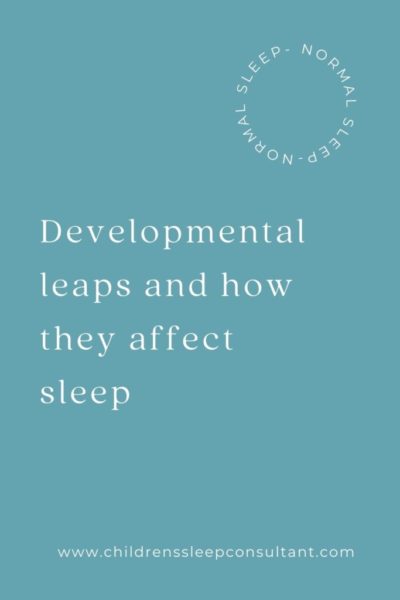Developmental leaps and how they affect sleep
Babies are tricky little things at times. Just when you think you *might* have a routine figured out that works for the family, they go and mix it all up for a bit of fun.
Suddenly they don’t want to take that morning nap at the same time anymore, despite having taken it at that time for a good few weeks previously. And now they want a longer nap in the morning and shorter in the afternoon, just as you arranged your diary to fit baby groups in the mornings, so you’re free for sleep later in the day. No matter what, these babies like to keep you on your toes!
Did you know that developmental leaps can affect the way that your baby sleeps? Read on to find out more…
What is a developmental leap?
Simply put, a developmental leap is a period in a baby’s life where she begins to learn new tricks. Hand-eye coordination, rolling over, crawling, walking, etc. These are all marked and major developmental leaps that your baby will go through. There are other, smaller leaps, too- some of which you may not be aware are occurring.
According to Dr Plooij, creator of The Wonder Weeks, the first developmental leap begins as early as five weeks after your baby’s due date. So this first leap can come a little sooner or later, depending on how close to your due date your baby was born. Dr Pooij and his team believe that babies become more fussy, clingy, and prone to crying during these developmental leaps because they are experiencing profound changes beyond their control. They are becoming more aware of the world around them, of new sensations and emotions, and they are starting to attempt to understand this strange world they are in. It makes sense then that sleep can be affected by these leaps!
Developmental leaps continue until your baby is around 18 months of age, and so you can expect some changes to the routine now and then until around that age.
How developmental leaps affect sleep
Knowing the cause of baby being a little unsettled or fussy is often half the battle when it comes to sleep, but there are things that you can do to make each leap as painless as possible. First, understand how sleep may be affected.
- Remember that your baby is an individual with a unique temperament, which affects how they sleep. During a developmental leap, sleep is likely to need more attention from you than ever.
- During a developmental leap, your baby may become clingy and cry when you leave her in her cot.
- Your baby may suffer separation anxiety and experience feelings of upset when you are not by her side.
- Your baby may crave lots more physical contact from you and want to be fed a lot more than usual.
- Your baby may experience mood swings and require a lot more attention from you during waking hours.
- Your baby may take longer to settle to sleep than usual and sleep for shorter periods.
- Your baby may be so determined to learn a new skill that she refuses to rest or sleep well until she’s mastered it. Again, it pays to be mindful of your child’s temperament.
- Your child may have long awake periods throughout the night where nothing seems to be wrong; they’re just awake, wide awake.
How to help baby sleep during a developmental leap
- Accept that sleep is going to be affected. Once you accept that this is a possibility, it will make it easier for you to move on and help your baby.
- Enlist some help. If your baby is going to be awake for more or more extended periods during the night, you don’t want to be doing it alone.
- Make time in your day for rest or quiet activities. If you aren’t sleeping well at night, this makes sense! And for baby, it can be a confusing and tiring time too, so when a developmental leap is in full swing, take care to limit your calendar if you can.
- If your baby is determined to master a new skill, such as crawling, help her as much as you can. Your child will need to perfect these new skills everywhere; if the only time they have to work on these skills in their bed is when they should be sleeping, that’s when they’ll practice. Playtime in the crib every day (more than once if possible) will help you.
- Be mindful of the type of leap your baby is experiencing, and target play activities accordingly.
Remember: this too shall pass. Developmental leaps certainly can be hard work, but they don’t last forever, you will get through it and back to normal before you know it. Good luck!






